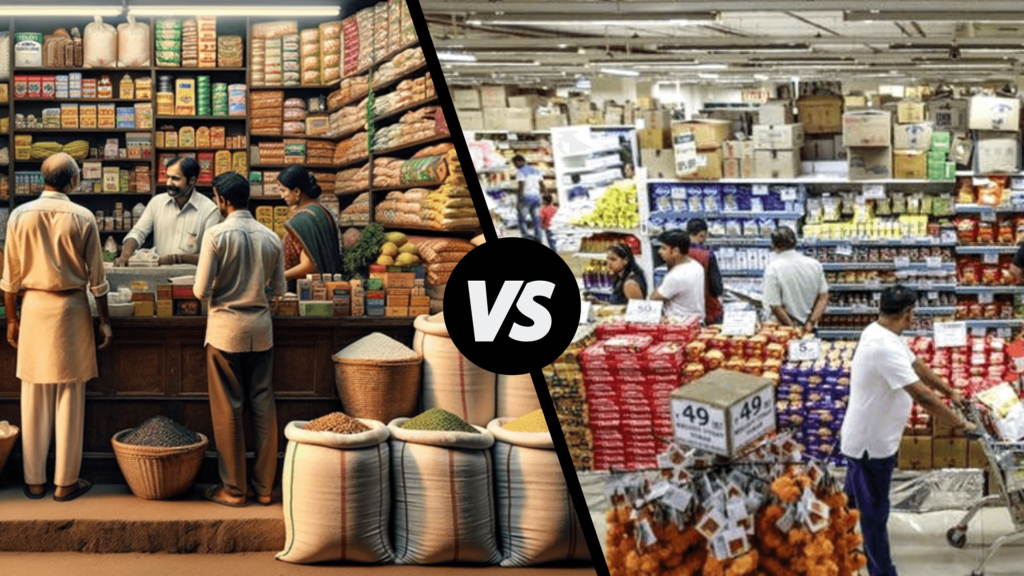
Start a supermarket business in India can be rewarding, given the country’s rapidly growing consumer market. With a population of over 1.3 billion people and increasing purchasing power, the demand for the availability of preference-based product is on the rise. If you’re considering starting a supermarket, this blog will help you with the steps and things to keep in mind when starting a Supermarket :
1. Market Research:
Conducting thorough market research is essential in laying the foundation of a successful supermarket. Analyze the local market to understand the competition, consumer behavior, and current trends. Consider factors such as population density, demographics, income levels, and consumer preferences. This research will help you identify potential gaps in the market and design your supermarket to meet the needs of your target customers.
Article you may also like : Investment required to start a Supermarket in India
2. Ideal Location:
Choosing the right location for your supermarket is crucial to its success. Look for areas with high footfall, such as residential neighborhoods, commercial districts, or Shops within malls or Shopping centres. Ensure easy accessibility and good visibility.
3. Permits and Licenses:
Acquire all the necessary Licenses and Permits, such as Trade and Gomasta licenses, etc., that are required to start and operate your Supermarket in India. You can also check out our blog for more information on the same Here.
4. Store Layout and Design:
The layout and design of your supermarket play a significant role in attracting and retaining customers. Aim for a spacious and organized layout that allows easy movement for shoppers. Divide the store into different sections, such as fresh produce, dairy, groceries, household items, and non-food items. Invest in appropriate shelving, Refrigerators, proper signage, and lighting to enhance the shopping experience.
5. Product Assortment:
Offering a diverse and customer-centric range of products is vital for attracting customers and meeting their varied needs. Stocking a wide assortment of groceries, fresh produce, dairy products, frozen foods, snacks, beverages, personal care items, household essentials, and non-food items can help cater to the maximum number of customers that visit your supermarket. Based on the information you get from your research, consider including both International and local brands to cater to different preferences. Regularly monitor consumer trends and preferences with the help of sales reports and adjust your product assortment accordingly.
6. Supplier Management:
Establishing strong relationships with reliable Wholesalers and Distributors in your region is crucial to ensure a consistent supply of quality products at competitive prices. Negotiate favorable terms with wholesalers to maximize your profit margins. Regularly evaluate and compare the prices, quality, and delivery timings of different suppliers to maintain a balance between cost-effectiveness and product quality.
7. Staffing:
Hiring an adequate number and competent staff is essential for the smooth running of a supermarket. Recruit employees who have good communication skills. Provide them product information, and basic training for efficient management of various processes.
8. Marketing and Promotion:
Effective marketing and promotion strategies are vital to create awareness and attract customers to your supermarket. Leverage both traditional and digital marketing channels to reach your target audience. Invest in local advertising, distribute flyers, and run promotions to attract customers. Establish an online presence through medium like What’s App, Facebook Ads, etc. to engage with customers and promote special offers.
9. Technology and Automation:
Integrate technology to streamline operations and enhance customer experience. Use Point of Sale (POS) system for billing, inventory management, and sales analysis. Use customer relationship management (CRM) tools to gather customer data and personalize offers. Explore options for online ordering and home delivery services to cater to the growing demand for convenience.
10. Customer Loyalty Programs:
Implement customer loyalty programs to encourage repetitive sales and build a loyal customer base. Offer discounts, reward points, or exclusive offers to customers who frequently shop at your supermarket. Use customer data to personalize offers and provide tailored recommendations, enhancing the shopping experience and customer satisfaction.
11. Continuous Improvement:
Once your supermarket is completely set up and starts operating regularly assess your supermarket with the help of Customer Feedback and various reports generated with the help of software and make alterations to your operations in accordance with it.
Remember, the key to sustaining a profitable supermarket business lies in continuously adapting to changing customer preferences and market trends. Stay updated with the latest industry developments, embrace technological advancements, and prioritize customer satisfaction. Regularly analyze sales data, seek feedback from customers, and make necessary improvements to enhance the overall shopping experience.
Starting a supermarket business requires dedication, hard work, and a customer-centric approach. By providing quality products, exceptional service, and a pleasant shopping environment, you can build a loyal customer base and establish your supermarket as a trusted destination for all their daily needs.
Tap into the potential and grow your Supermarket Business by getting in touch with Kirana Friends. You can connect with a Kirana Expert by calling or messaging us on 8010442222.
You can also download the Kirana Friends Application from the Google Play store by clicking on the link below and learning how to run your store more profitably.





